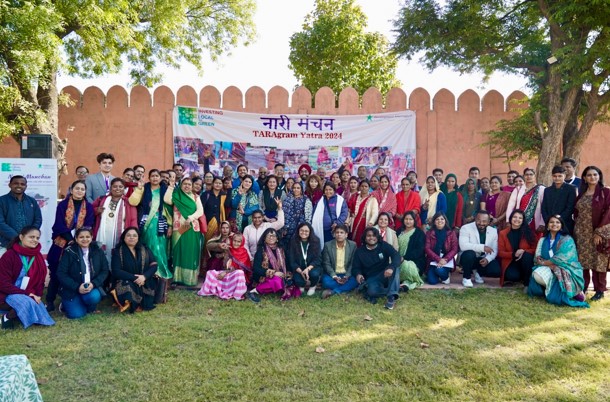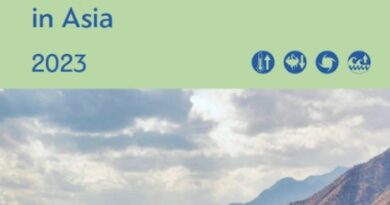TARAgram Yatra 2024 Demonstrates Successful Corporate and Policy Partnerships

TARAgram Yatra 2024, the flagship event of Development Alternatives (DA), brought together social impact enthusiasts, civil society leaders, social innovators, policymakers, corporate, government officials, and changemakers, with the aim to showcase replicable, scalable impactful work on-ground that has happened alongside communities at grassroot level. The Yatra focused on UP’s Bundelkhand region this year, besides a discussion at the picturesque location in bordering Orchha, Madhya Pradesh, where DA has a campus.
It was a huge learning opportunity for participants representing various stakeholders who came together to meet communities and understand their challenges. Through this rural learning and immersion program, community members could highlight their lived realities, providing invaluable insights into local needs and innovative grassroots solutions.
The yatra began with TARAgram Mela, which brought together artisans from across the country to showcase their work. Women leaders of the communities were in the spotlight at Nari Manchan, where 22 rural womenpreneurs narrated their challenges and their solutions, highlighting the critical issues they face and the innovations they are driving.
The Yatris then travelled the length and breadth of Bundelkhand to witness the work, and change that has been brought about by DA over the years. Three Yatra’s, three different themes-Circular Economy, Rural Livelihoods and Climate Resilience were flagged off by DA’s CEO Shrashtant Patara.
The yatra on Circular Economy, took the yatris to Mador Village where they witnessed transformative application of circular economy principles through sustainable building practices and innovative material use. Demonstrations at TARA Nirman Kendra, Orchha included alternative construction materials such as fly ash bricks and limestone calcined clay cement (LC3), emphasizing resource efficiency and low-carbon solutions. Discussions revolved around integrating these models into mainstream practices to drive systemic change.
Another set of Yatris went on the yatra with focus on Creating Rural livelihoods through Skilling and Entrepreneurship, with field visits to Shakti Kendra, Ghugwa Village showcasing a small lens into micro-movements in the form of enterprises. Participants engaged in dialogues with community members, gaining insights into innovative practices that promote sustainable and inclusive economic resilience. Further the Yatris witnessed the proceedings of Kaun Banega Business Leader an innovative tool to identify local business leaders at Village Simrawadi.
The focus on Building Climate Resilience through Ecosystem Restoration was demonstrated by the visit to Budhpura Village. Community-led initiatives, including the construction of check dams and the implementation of the WADI model of farming, showcased the transformative power of restoring ecosystems. Yatris also witnessed the working of the Radio Bundelkhand and how it has been amplifying a progressive message to more and more members of the community.
With more than 300 community members actively participating, the Yatras highlighted the critical role of grassroots innovation in mitigating climate vulnerabilities and fostering adaptability to environmental challenges. During the TARAgram Yatra 2024, participants witnessed a collaborative panel discussion, Nadi Kinare Chaupal on the banks of the Betwa moderated by the Indian Climate Collaborative (ICC), aimed at understanding and advancing community-led climate action.
Later, the conclusive plenary, Saar Sangam, brought together key stakeholders for a policy level discussion, including Padma Shri Uma Shankar Pandey Ji, representing the community; Amita Sharma, Former Joint Secretary of the Ministry of Rural Development, as the voice of the government, Prabhakant Jain, CSR Head of DS Group bringing in the corporate perspective; Ram Sanjivan ji of Manviya Drishtikon Sewa Samiti, as the voice of grassroots and Prof. V Padmanabhan from Goa Institute of Management presenting the academia side and also as the Knowledge Partner for the Yatra. These discussions bridged grassroots challenges with institutional expertise, emphasizing nature-based solutions and sustainable livelihoods to connect community actions with policy frameworks.
“TARAgram Yatra 2024 was a proud moment for Development Alternatives as it showcased its 40 plus years in Bundelkhand. This year’s Yatra was special as we have tried to focus on how industry can play a critical role in contributing towards creating social impact. Our various conversations during the Yatra and the three Yatra’s itself highlighted how corporates can lead the change and how best they can meet the challenges to drive this change. Bundelkhand was the microcosm example of this much desired change across India. We hope to replicate, scale and accelerate our work across India with renewed fervour to help build a nation that is resilient and futuristic. To showcase that humans and planet can coexist and prosper,” said Dr. Ashok Khosla, Chairman, Development Alternatives.
Our View: Having been a part of the Yatra as a guest of Development Alternatives , we were glad to see first hand the changes underway in districts considered backward, like Bundelkhand. While there is no doubt about the many challenges the region faces, especially the higher risk of climate change which has already cast a shadow with unpredictable and below average rains over the past decade, the visit underscored the need to preserve local knowledge of adaptability and managing resources. From a communications perspective, one couldn’t but help wonder if a higher focus on training on digital tools wouldn’t help communications both ways, considering corporatisation of media and weak coverage of regional issues in mainstream media now. The insights from corporate leaders served to highlight both their limitations in funneling CSR efforts towards rural regions, and the opportunities where they can make a larger impact. One would imagine there is a much bigger opportunity there also at the policy level to support such backing along with local level impact analysis and reporting to keep it transparent for all.




